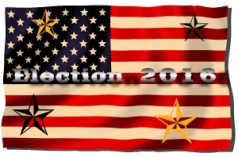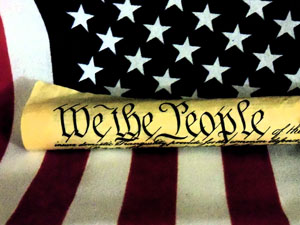 What direction will America take? Will she choose to take the easy, intellectually bankrupt path to European-style socialism, or will she stay true to her self and take the less easy but potentially more rewarding path? Will we decide that things like the Constitution and Declaration of Independence are just curiosities of a bygone era, or that those documents still mean something and still ought to be followed? America is at a crossroads, it’s cliche but is no less true. Where other elections have been about tax rates, or what the defense budget should be, this election is over the very what the very purpose of government is, and what America’s role in the world should be.
What direction will America take? Will she choose to take the easy, intellectually bankrupt path to European-style socialism, or will she stay true to her self and take the less easy but potentially more rewarding path? Will we decide that things like the Constitution and Declaration of Independence are just curiosities of a bygone era, or that those documents still mean something and still ought to be followed? America is at a crossroads, it’s cliche but is no less true. Where other elections have been about tax rates, or what the defense budget should be, this election is over the very what the very purpose of government is, and what America’s role in the world should be.
 If you’re voting for free education, or for lower taxes, you’ve missed the whole argument, the real question being put to the voters this year. This year you have to choose sides. The question before us is no less than that put before the Constitutional convention in May of 1787: What sort of republic will America be? We have to decide anew what sort of country we’ll have for the rest of the 21st century. People will say this is exaggeration, hyperbole. They don’t get it. They would be at a loss to explain why those men spent all that time in the hot Philadelphia summer many years ago, deliberating, discussing, arguing, deciding. They would not understand what the big deal was, how momentous that achievement was. They do not see that it is 1787 all over again, and the choice once again is: Who will rule the people of this country and how? Will Americans be the rulers or be the ruled? We need to choose wisely, and understand the far-reaching effects of our vote.
If you’re voting for free education, or for lower taxes, you’ve missed the whole argument, the real question being put to the voters this year. This year you have to choose sides. The question before us is no less than that put before the Constitutional convention in May of 1787: What sort of republic will America be? We have to decide anew what sort of country we’ll have for the rest of the 21st century. People will say this is exaggeration, hyperbole. They don’t get it. They would be at a loss to explain why those men spent all that time in the hot Philadelphia summer many years ago, deliberating, discussing, arguing, deciding. They would not understand what the big deal was, how momentous that achievement was. They do not see that it is 1787 all over again, and the choice once again is: Who will rule the people of this country and how? Will Americans be the rulers or be the ruled? We need to choose wisely, and understand the far-reaching effects of our vote.
End of lecture.
AFTER THE VOTE
The voting has been completed. A candidate is announced as the winner. The results are either accepted or a process to contest is begun. Let’s assume that on January 20, 2017 a new President is sworn in as the Chief Executive of the United States. Seventeen days before, the 115th Congress will begin its business, the House of Representatives with 435 newly elected members and the Senate with one-third of its 100 members having be elected or re-elected. The Third Branch of Government – the Supreme Court – is short-handed, seemingly equally divided on many issues, and members of one party have stated they will block any new nominee.
The media is having a field day with the divisions clearly sparking in all directions; there is concern in the financial markets; the many difficult international situations are creating havoc throughout the planet with concerns expressed by America’s “allies” as to their future relationships to America; and the politicians of all persuasions are already going into their trenches or foxholes.
Of course, we hope that lightening does strike and that “We the People”- as individuals, as families, as neighborhoods, as greater communities, as those who are open to the gift that that the astute men we honor as our “Founders” fashioned in inventing a new form of government will reassess our path to the future relying upon the Constitution and the values in its Preamble.
That invention acknowledged that we are basically self-serving people and that it would not work to rely on citizens to rise above their own interests to join in achieving some larger good that they would recognize by reasoning together. The founders recognized that we are not imbued with “pubic virtue”– and that the “blank slate” that Thomas Paine had described America as having in 1776 ran into great troubles soon thereafter. The people had nearly let their army starve; they had competed one state against another for the upper hand in trade. They had defaulted on their debts, while profiteering, and refusing to work together.
The situation in America today can been seen as an update on the problems these Founders faced – and in response they created a set of values in the Preamble that underlies the growth and prosperity of the nation that has lead us into becoming the leader of the free world. Now, paraphrasing Abraham Lincoln’s words: our founders brought forth on this continent, a new nation, conceived in Liberty, and dedicated to the proposition that all men are created equal. Now we are being tested once again as to whether this nation, or any nation so conceived and so dedicated, can long endure. So it is for us to be dedicated to the great task remaining before us — that we here highly resolve that this nation shall have a new birth of freedom and that government of the people, by the people, for the people, shall not perish from the earth.
Those men who got together in 1787, after being chosen by their states, went way beyond their instructions to fashion a new set of ideas about government and democracy. This has been described as acceptance of “conflict within consensus.” The Constitution that was created, and unanimously accepted after over four months of debate and compromise, was finalized by a group of five men who constituted the Committee on Style and Arrangement. These men were James Madison, Alexander Hamilton, Gouvernour Morris, Rufus King and William Samuel Johnson. Perhaps their greatest contribution was the recasting of the Preamble. The Preamble and all it came to represent was the unique achievement of a remarkable group of men at a momentous turning point in American History.
So, let us go forward with the gift we, as the posterity of our Founders, was given.
“We the People of the United States, in Order to form a more perfect Union, establish Justice, promote domestic Tranquility, provide for the common defence, promote the general Welfare, and secure the Blessings of Liberty to ourselves and our Posterity, do ordain and establish this Constitution for the United States of America.”
For more information, see: http://www.promiseamericaindicator.com.
LikeLiked by 1 person
very good
LikeLike
JP, If we could sit down with those men who fashioned the Preamble and the Constitution I think we’d find it very difficult to pinpoint the exact same ‘intent’ on what inspired each of them as they were drafting our nation’s founding principles. The USA has been a messy endeavor right from the beginning. …. And, of course, we know that Thomas Jefferson’s Declaration of Independence has opened the floodgates of differing views of ‘intent’. ~ “the boisterous sea of liberty is never without a wave.” ~
Each individual citizen can’t expect government to conform to their conviction of intent. There’s got to be room for this ‘boisterous sea of liberty’ to work and in the end, whoever is our next president that system will continue to work. Thanks for the thought provoking post. 🙂 ML
LikeLike
It’s been said that most of those men in 1787 went to Philadelphia thinking they would just tinker with the Articles of Confederation for a few days and go home. We know that was not to be the case. What they did turned out to be much more important. I would suggest that the American people today, on election day find themselves in a similar position. Like those men, many have no idea how important their votes will be, not just for them but for all Americans for the foreseeable future. I believe that long after we’re gone, historians will view the 2008 elections as a point where America deviated from the course those men charted, and that the 2016 elections were the last chance to change back to true rule of law through the Constitution.
LikeLike
Are you referring to the use of Executive Order? I was just reading about Gouverneur Morris who wrote the Preamble and was one of the signers of the Constitution. He was from the north and considered slavery an abomination while others from the south would not have agreed with that. Hasn’t the rule of law been up for debate all along? Changes to the Constitution haven’t been made frivolously yet the rule of law has changed along the way, so there has been flexibility within the Constitution.
LikeLike
Not just executive orders, but the bureaucracy. Non-elected officials now how nearly as much power over our lives through regulation as do the elected ones.
LikeLike